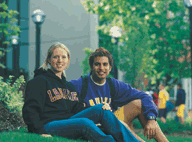Doctor of Philosophy in Social Work
This program provides students an opportunity for intellectual challenge and professional growth through the supported development of an independent research program. The PhD program supports the integration of theory and practice undergirded by coursework on the nature and production of knowledge. Students explore paradigms essential to understanding the practice relevance of, for example, feminism, anti-racism, anti-colonialism, social change, global studies, post-modernism, and self and subjectivity.
Students critically reflect on social work practice at macro and micro levels from a variety of theoretical and methodological perspectives. Students engage with social issues that span the global and local from the perspective of analyzing systemic and structural issues, as well as how these play out in the lives of individuals and families. Drawing on scholarship across a broad and multi-disciplinary range, students contribute to scholarship in fields such as health and mental health, child welfare, addictions, corrections, disabilities, immigration, social policy, social justice, and administration.
- Admission Requirements
- Program Requirements
- Residence Requirements
- Examinations
- Field Learning Option
- Teaching
The PhD program seeks applicants who possess the following qualifications:
- A Master of Social Work degree from a recognized university, normally with at least an A- average in the master's program. Applicants with other graduate degrees and strong social service experience may be considered.
- Normally a minimum of three years post MSW experience. In addition, the applicant must provide evidence of a level of professional competence suitable for admission to the PhD program.
- Evidence of scholarly ability for clear and creative thinking and the ability to pursue independent study.
The program consists of a minimum of eight half-credit courses. Seven courses are required for all students and the eighth is an elective corresponding to the student's study plan and interests. A comprehensive examination and a dissertation are required.
During the first academic term each student, in collaboration with the Associate Dean: PhD, will prepare a study plan based on the above guidelines.
Course Schedule
Year One
- SK704 - Applied Quantitative Research Methods
- SK790 - Social Work Thought and Theory Development
- SK791 - Epistemology and the Nature of Social Work Knowledge
- SK801 - Advanced Qualitative Data Analysis
- SK805 - Applied Qualitative Research Methods
- SK820 - Doctoral Seminar
- one elective
Year Two
Years Three and Four
- SK899 - PhD Dissertation
The PhD comprehensive examination addresses theory and literature related to the students' dissertation interests. The comprehensive examination serves to assess the student's ability to (1) integrate social work knowledge, theory and practice; (2) analyze the implications of knowledge and theory for social work practice; and (3) demonstrate a broad knowledge of the selected area of study. Students usually must have all coursework completed before beginning the PhD comprehensive examination.
Students complete two comprehensive papers: (1) the theoretical framing for their proposed dissertation, and (2) the review of the relevant literature that supports their proposed dissertation research. The student determines the order in which the papers are written. After completion of both papers, an oral defence of both papers occurs. A satisfactory oral defence of both papers is required for successful completion of the examination. Guidelines for the content, scheduling and timeline, and format of the examination are outlined on the PhD program website. In exceptional circumstances, and with their comprehensive examination committee's approval, a student may undertake one paper that addresses both theoretical framing and literature supporting their proposed dissertation.
All members of a Comprehensive Committee must have Graduate Faculty Status at the time of appointment to the Committee. Papers will be read by all members of the student's comprehensive committee. Following the defense of the Comprehensive Papers, the Comprehensive Committee must assign one of the following categories:
- Accepted
- Accepted with minor changes
- Decision deferred; major changes required
- Rejected/Failed
A majority of the members of the Comprehensive Committee must assign either the "Accepted" or "Accepted with minor changes" category in order for the student to successfully complete the requirement. The category assigned is based on both the written and oral components of the comprehensive examination.
In the case where the decision of a majority of the committee is "Decision deferred; major changes required" the student must resubmit and re-defend the papers; this is considered the second and final attempt to meet the expectations of the full comprehensive requirement. Similarly, if the category assigned to the first attempt is Rejected/Failed, the student may resubmit and re-defend the papers only once. A student who does not complete SK893 after two attempts or within three consecutive terms for full-time students or six consecutive terms for part-time students will be required to withdraw from the PhD program.
The regulations and procedures at the university in which the student is registered will govern both the dissertation and the examination formats.
Students are required to spend a minimum of four terms as full-time students. It is expected that most students will extend this period beyond the minimum.
Each PhD student is required to submit, by May 1 annually, the PhD Supervisory Report Form. See the section on in the Graduate Calendar on Academic Standing for details.
Years 1 and 2
Students are expected to spend at least four (but not more than seven) academic terms in preliminary study to complete the comprehensive requirements including:
- Successfully completed the required courses and any additional course work prescribed by the student's doctoral committee.
- Successfully completed and defended the comprehensive paper.
Years 3 and Beyond
Following completion of the comprehensive requirements, a student has a maximum of five terms in which to meet the following requirements:
- Completion of additional course and/or practicum requirements prescribed by the doctoral committee.
- Completion and defence of the dissertation.
It is necessary to maintain continuous registration unless an inactive term has been granted per university policy.
All standards for examinations are set by the Graduate Faculty Council and the Senate of the University. The regulations for doctoral students are as follows: the student is expected to pass, with a minimum of a B grade, the core courses and all additional course work required by the PhD Committee. In addition, the student is required to pass a comprehensive written examination covering the areas addressed in the student's selected area of concentration or write and orally defend a comprehensive paper covering the same area of concentration.
Students for whom field experience in a particular setting is necessary to advance their ability to conduct their research may request permission to enrol in SK809* - Field Learning Option. The student is responsible for identifying the setting, negotiating the details of the role and submitting a written proposal for the Field Learning Option to the PhD Committee for approval. Students approved for this option will be exempt from SK820 - Doctoral Seminar and the required elective course.
PhD students are expected to teach in the Master of Social Work program and are encouraged to enroll in the Instructional Development non-credit course for PhD candidates which focusses on effective teaching skills. The Faculty of Social Work is committed to providing appropriate teaching opportunities for PhD students subject to congruence between the expertise of students and the courses available.






